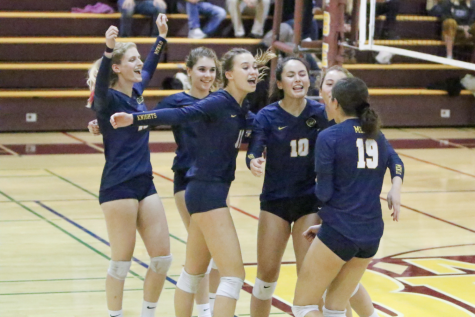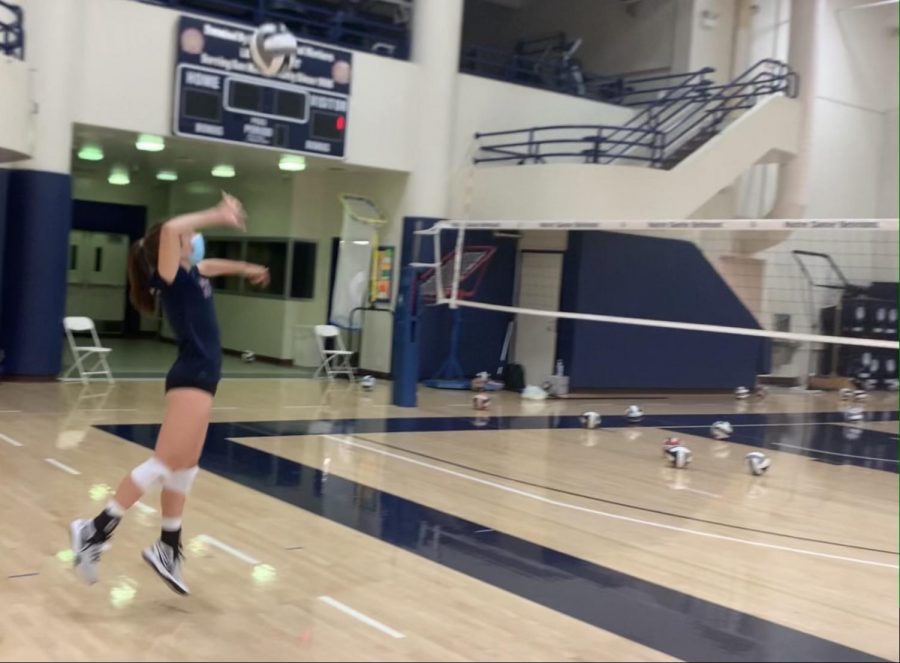Menlo Student Sues San Mateo County, State of California Over Indoor Sports Ban
Freshman Stella Buch practices volleyball with social distancing measures in place due to COVID-19. Photo courtesy of Stella Buch.
March 12, 2021
The family of freshman Stella Buch sued San Mateo County and the State of California on Feb. 26 regarding the state’s continuing COVID-19 related ban on indoor high school sports. The action became irrelevant several days later when the state prohibition was lifted.
California’s tier system requires specific case rates for activities to resume. Outdoor contact sports had been tied to an Orange Tier level, with an adjusted case rate of 1.0 to 3.9 cases per 100,000 people. On Feb. 19, Governor Gavin Newsom changed that requirement to allow all counties with a maximum case rate of 14 cases per 100,000 people to play contact sports.
But at the time of Buch’s filing, the indoor sports level remained Yellow Tier, with an adjusted case rate of fewer than 1.0 cases per 100,000 people, likely impossible to achieve before the 2020-2021 school year ends.
While Stella Buch was the named plaintiff in the lawsuit, her mother, Heather Buch, also played a prominent role. “The basis for the lawsuit was that youth sports are no less safe than college sports if they follow the same safety protocols. Since college and professional sports have been happening here in California, why do we continue in a complete ban on all youth sports?” Heather Buch asked. “The University of Wisconsin published a study, and The National Federation of High School Sports also ultimately concluded that there’s no higher incidence of COVID-19 among athletes than there is in the population at large.”
The survey by faculty at the University of Wisconsin’s School of Medicine and Public Health found that among more than 30,000 athletes participating in eight sports, across hundreds of schools from around Wisconsin in 16,000 practices and 4,000 games, only one athlete contracted COVID-19 through high school sports. However, some medical experts, including a group of six medical experts contacted by the Aspen Institute, questioned the study’s validity.
The dean of the University of Wisconsin’s School of Medicine and Public Health, Robert Golden, said that the study does not reflect the university’s views, has design limitations and has yet to be peer-reviewed. “We do not believe that this report should play a major role in shaping [high schools’] decisions,” Golden said to The Wall Street Journal.
The National Federation of State High School Associations also removed the article from its website and told the Wall Street Journal that it is reevaluating its research.
Additionally, Buch and her family focused on a gender inequality argument as another basis for the lawsuit. As a volleyball player, she felt strongly that the ban on indoor sports unfairly targeted female athletes. “I’ve played [volleyball] since fourth grade. This year will be my fifth year playing club and my sixth year playing [volleyball] for school,” Buch said. “[My mom and I] figured that [this lawsuit] was the best way to get the government’s attention and get them to realize that there’s just not enough opportunities for girls to play sports right now.”

Despite the approval of outdoor sports for both genders, Buch claims that a higher percentage of female athletes play indoor sports. “At least 87,000 girls [in California] aren’t getting to play their sports right now because volleyball and basketball are shut down, and [my mom and I] just thought that was unequal, especially because boys football was permitted,” Buch explained.
Not only does Buch believe that the ban disadvantaged girls, but it also encouraged Californians to travel to out-of-state competitions where indoor sports are allowed. “I think that if indoor sports were allowed, it would take a lot of the pressure off of athletes because we don’t want to have to skirt the rules. We just want to be able to play our sport and follow the rules in doing that,” Buch said. “If there are rules that allow us to play in California, it would be safer than having people travel all around the country to play.”
The Buch family contacted Stephen C. Grebing, an attorney from San Diego, to represent them in their legal proceedings. Grebing is passionate about their cause and has represented similar cases in nine counties across California. “I took these cases on because I have two kids in high school that play sports, so I had some connection to the issues in this case,” Grebing said. “It just seemed like a good thing to do with my training and education; it seemed like a really worthy thing to get involved in and try to make a difference.”
Grebing alleged that the state’s indoor sports ban violated Buch’s equal protection rights under the Equal Protection Clause of the 14th Amendments to both the United States and California Constitutions. “[The clause] basically says that if you have a similarly situated group of people, the government can’t make a different set of rules within those people,” Grebing said. “For us, it’s that California let the professionals and the colleges play and put together a very specific guideline and mandate to let them play safely, but the state never allowed high school kids an opportunity to play, and we couldn’t find a reason why they didn’t allow [high schoolers] to.”
However, there were new developments to the indoor sports ban shortly after the Buchs filed their lawsuit. A similar lawsuit filed by high school football players in San Diego County, also represented by Stephen C. Grebing and his firm, reached a legal settlement with the State of California that lifts the remaining restrictions on high school sports.
In response to that settlement, the Buchs re-evaluated their lawsuit. “We got what we wanted. We plan to settle [the lawsuit] assuming that [San Mateo] County agrees,” Stella Buch said. Buch excitedly welcomed the settlement and is excited to start her Menlo volleyball career.



